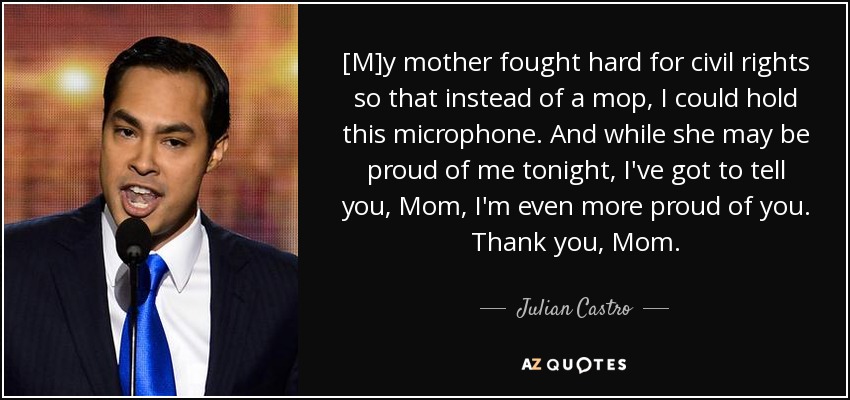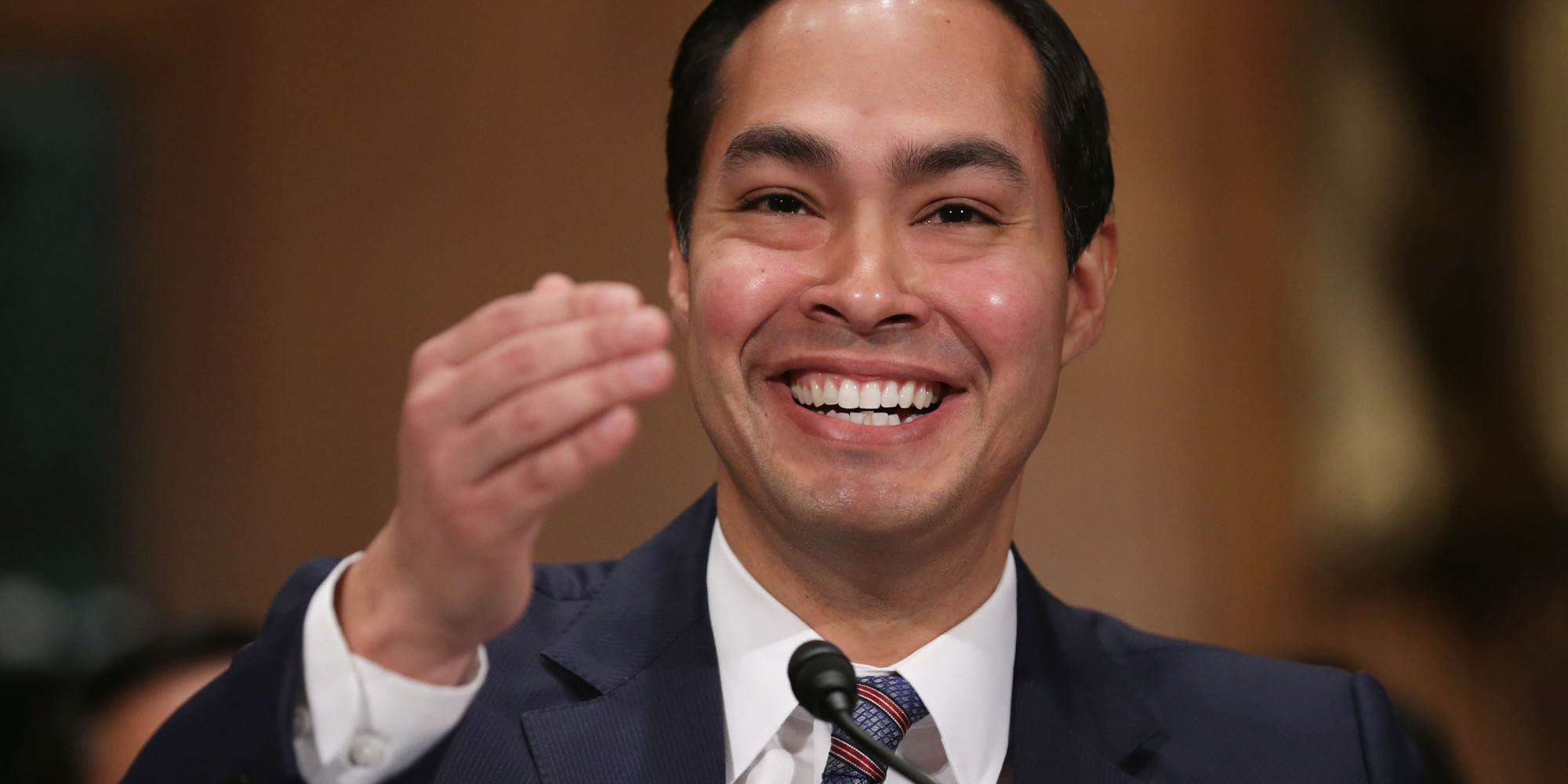
Julián Castro
Ten Things To Know About Julián Castro
Julián Castro Gives Brilliant Keynote Address At Democratic National Convention
Julián Castro Warns Latinoos Would Suffer If G.O.P. Abandons Obamacare
http://paxonbothhouses.blogspot.com/2016/01/julian-castro-warns-latinos-would.html
The 10 things you need to know about Julian Castro
President Obama announced today that he is nominating Julian Castro, mayor of San Antonio, Texas, to be the next secretary of Housing and Urban Development. Our colleagues over at Wonkblog listed a few of his career highlights and qualifications for the job this morning. Here are the 10 things you need to know about Castro.

1. He has a twin brother in the House of Representatives.
Joaquin Castro first ran for the Texas state legislature in 2002, and served there until 2012. He won election to Texas's 20th congressional district seat in 2012, and his fellow representatives elected him president of the 113th Congress' Democratic freshman class. He wrote an essay on his first year in Washington for Texas Monthly in February 2014.
2. Julian has been mentioned as a potential vice-presidential candidate a few hundred times.
ABC News' Robin Roberts asked former secretary of state Hillary Clinton in early May, “Were you to run for president in 2016, would you consider Elizabeth Warren or Julian Castro for your running mate?” Her answer: “I’ve been asked this question many different ways. This is one of the cleverest.”
The New York Times reported that Henry Cisneros, Castro's mentor, former San Antonio mayor and a former Clinton administration Cabinet member, told him: “I advised that he accept a position for President Obama. I thought that if he was going to be vice-presidential material in 2016, then he needed to be more than mayor at that time.”
Latino Decisions ran a poll in July 2013 which asked Hispanics whether they would be more likely to vote for the Democratic ticket if the Mexican-American Castro were the vice-presidential pick. Sixty-two percent said they would be more more or somewhat more likely to vote Democratic if that were the case.
Last year, the Washington Post asked Castro if he thought Clinton would be a good person to make the Democratic a big-tent party post-Obama. He responded:
Oh, sure, I believe she can. Of course, she has excellent credentials throughout the party landscape – as someone who is seen as a progressive champion on healthcare in the ‘90s and children’s education, but also, of course, most recently her tenure at the State Department, her support for President Obama’s threat of military action [in Syria] shows the centrist credentials that she brings. I do believe that she can hold together the coalition that the president has.
3. “Julián Castro has a very good chance of becoming the first Hispanic president of the United States."
So said George W. Bush adviser Mark McKinnon to the New York Times in 2010.
4. In 1994, he worked as a White House intern.
Castro has also been to the White House for a national jobs summit. He gave the keynote speech at the Democratic National Convention in 2012, in which he laid out the origin story that makes him so appealing to a party that wants to reach as much of the American populace as possible.
The unlikely journey that brought me here tonight began many miles from this podium. My brother Joaquin and I grew up with my mother Rosie and my grandmother Victoria. My grandmother was an orphan. As a young girl, she had to leave her home in Mexico and move to San Antonio, where some relatives had agreed to take her in. She never made it past the fourth grade. She had to drop out and start working to help her family. My grandmother spent her whole life working as a maid, a cook and a babysitter, barely scraping by, but still working hard to give my mother, her only child, a chance in life, so that my mother could give my brother and me an even better one.As my grandmother got older, she begged my mother to give her grandchildren. She prayed to God for just one grandbaby before she died. You can imagine her excitement when she found out her prayers would be answered—twice over. She was so excited that the day before Joaquin and I were born she entered a menudo cook-off, and she won $300! That's how she paid our hospital bill.
In the end, however, his three-year-old daughter kind of stole the show.
5. Castro could have only run for mayor in San Antonio one more time.
San Antonio mayors have a term limit of four two-year terms. Castro is in the middle of his third term right now. He first ran for mayor in 2005, and lost the Democratic run-off.
6. In 2010, a reporter asked him if he would accept a cabinet position.
Here's the exchange, with Zev Chafets for New York Times Magazine:
“Would you accept a cabinet position?” I asked. That was the route taken by Cisneros.“Not likely, no,” Castro said in a way that suggested he had been considering it.I asked what that left: “President?”“It is way too early to be thinking about that,” Castro said.
After Obama won reelection in 2012, the White House approached Castroabout the transportation secretary position. Castro was not interested. A columnist at the San Antonio Express-News reported last week, "In private conversations, though, [Castro has] said an offer from the president to serve as education secretary would have proven tougher to turn down." One of Castro's biggest achievements in San Antonio has been expanding educational opportunities for low-income students in the city.
7. Castro will be the youngest person on Obama's cabinet.
The San Antonio mayor in 39; Transportation Secretary Anthony Foxx is 43. There are currently two Hispanic members of the cabinet, Secretary of Labor Tom Perez and Maria Contreras-Sweet, administrator of the Small Business Administration. In 2013, the National Council of La Raza was disappointed with the number of Hispanics serving in Obama's cabinet, and were beginning to focus on getting more Latinos appointed in lower level positions. The council's political director told Bloomberg in 2013, “There’s lot of other layers where there could be more representation of the best and the brightest Latinos."
8. The mayor's memoir is scheduled to be published in 2015.
He apparently rents hotel rooms out of town when he needs peace and quiet to write.
9. The Castro brothers' mother Rosie Castro is a well-known political activist.
Texas Monthly summarized her career in 2002:
Inspired by the ideology of the national civil rights and anti-war movements of the sixties, as well as by the work of La Raza Unida, a flourishing but ultimately short-lived third-party movement, Rosie and her kind wanted neighborhoods to have a direct voice in matters that affected them. "Barrio representation" they called it.And so they mobilized, organized rallies, registered voters, and ran for office—sometimes in droves, just to make a statement. A firebrand who could step up to the podium and incite a crowd "in real hell-raiser fashion," as one contemporary described her, 23-year-old Rosie herself ran for the city council in 1971 on a slate called the Committee for Barrio Betterment. She finished second among four candidates in the primary for Place 3. None of the slate's candidates won, yet their election results helped lawyers with the Mexican American Legal Defense and Educational Fund (MALDEF) convince the U.S. Justice Department that, if San Antonio council members were elected from individual districts instead of citywide, Mexican Americans in San Antonio would have chosen some of their own.Two life-altering things happened because of Rosie Castro's engagements in those heady days. First, she had the twins, on Mexican Independence Day. Then, facing federal pressure in 1977, San Antonio voted to shift from electing council members at-large to a single-member system, forever changing the racial makeup of municipal leadership and making it possible for a future generation to achieve what she had not.Rosie had uttered some prophetic words when she lost the election in 1971: "We'll be back," she told the San Antonio Light. And exactly thirty years later, she was. In 2001, just one year out of law school (on Cinco de Mayo, mind you), 26-year-old Julián Castro became the youngest city councilman in San Antonio history, soundly defeating five challengers with 59 percent of the vote. Friends and family had watched Julián's political ambitions blossom in college and felt certain that he would run, especially after he began raising seed money among law school friends at Harvard. It was destined to be, one could almost say, considering that Rosie had raised her two boys in the world of politics and activism and had showed them, over and over, the importance of serving their community. "When Julián was installed, it was just such an incredible thing to be there because for years we had been struggling to be there," Rosie says.
She helped run Julian's 2005 mayoral campaign too. She told Vogue in 2013, "One of the things I learned long ago is that for campaign managers and staff, it’s often difficult to deal with family. I made a promise to myself that I wouldn’t be the interfering mother that went over to city hall every day. And you can ask them — I barely ever do.”
10. Neither Julian nor Joaquin speak Spanish.
Julian took Latin in high school, Joaquin took German. Julian told Vogue in 2013, “I’ve resolved that before I die, I want to speak it fluently." At the time, Joaquin was listening to language tapes sent by fellow Texan Eva Longoria.


No comments:
Post a Comment